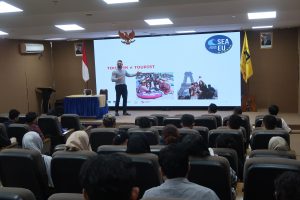Have you ever felt tired and unfocused when fasting? It is probable that your body does not have the proper nutrition to thrive. It is still important for your body to receive a fair amount of nutrients and be healthy whether you fast or not.
A nutritionist and a lecturer in the Health Science Faculty (FKes) at Universitas Dian Nuswantoro (Udinus), Vilda Ana Veria Setyawati, S.Gz., M.Gizi., revealed several tips for one’s body to get sufficient nutrition so one can thrive during fasting. In terms of time, Vilda stated that eating not long before Imsak was preferable. As for the food, I suggest you eat foods with dense nutrients.
Vilda also emphasized the importance of proper food ingredients, with carbohydrates, protein, vitamins, fat, and minerals. I recommend you avoid simple carbs of food, like rice and bread. This is because simple carbs will only be broken down and absorbed upon their entrance into our body.
“Eating such thing would indeed be filling to our stomach, but we will also get hungry very quickly. I suggest we should eat some complex carbs like potatoes, corn, and tubers. These complex carbs will be slowly ingested upon entrance to our stomach, so we will not be full quickly. However, if you can’t eat without rice, you can eat it as a supplement. According to many people, a meal does not count if one does not include rice,” she explained.
Additionally, one should also eat foods comprised of fat and protein, with the protein being the most dominant between the two, for example, two eggs, chicken breasts, and fish. It is also important to drink enough water, as well as consume vegetables and fruits, containing high amounts of water.
“As for the iftar, you might want to consume something sweet to revert your blood sugar level to its normal state, but it’s important to remember that sometimes less is more. I suggest we should eat dates, as they hold a high amount of carbohydrates, which is good for our body. In addition, dates are also comprised of electrolytes, like calcium and magnesium,” she explained.
Proper Exercise and Sleeping Hours
In addition to food ingredients, Vilda also said that exercising is just as important. These exercises include casual walking, stretching, or running on a treadmill for ten to fifteen minutes.
“Many people sleep after Fajr, but this is not recommended as human bodies are generally weak after waking up with a full stomach. Instead, we need to wait one and a half or two hours. During these hours, do some exercises with a light intensity,” she uttered.
Fasting can provide benefits with detoxification and stamina. However, it is important to note that it must also be accompanied by the correct dietary habits and proper sleeping hours.
As for the sleeping hours, the human body generally detoxifies from 11 PM to 2 AM. This means that if one were not to sleep well at 11 PM, their body wouldn’t detoxify. This detoxification process can only happen at night,” she concluded. (Humas Udinus/Ika. Foto: Humas Udinus)







